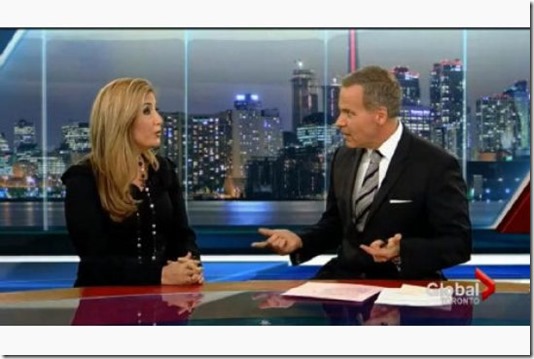Should Working Journalists Also Be Media Trainers?
According to The Toronto Star, a Toronto news anchor has been suspended due to concerns about a possible conflict of interest:
“Global Television news anchor Leslie Roberts has been suspended from the network after a Toronto Star investigation found he is secretly the part owner of a small public relations firm whose clients — lawyers, small businesses and others — appear on his show.
Roberts helps clients with pitches and media training and has tweeted positive comments about some of the clients to his 20,000 followers on Twitter. In one instance, during a morning show on which supermarket shopping was being discussed, he blurted out the name of one of his firm’s clients and suggested viewers “check it out.” At no time did he disclose to viewers his connection to the companies or his public relations firm: BuzzPR.”
“‘At Global News we take matters of journalistic integrity very seriously,’ Global spokesperson Rishma Govani told the Star. ‘Mr. Roberts has been suspended from his duties indefinitely as we conduct a full investigation into this matter.'”
The Star presented its findings to Roberts early this week. Roberts said he had done nothing wrong but would resign from BuzzPR, the public relations firm he owns with a partner.”
This post isn’t specifically about Mr. Roberts. Instead, I want to use this incident as a launching pad to a broader question: Should working journalists simultaneously serve clients as media trainers?
That’s not a theoretical question. I’m aware of firms who boast that their media trainers are working journalists. (I’m not disparaging those firms—at least one I know of that employs working journalists has a terrific reputation.)
From a client perspective, I can see the advantage of working with someone who’s still in the game. But how about from a journalism ethics perspective?
I suppose there are some exceptions for journalists who don’t train clients who fall within their coverage area. A sports reporter who trains a lifestyle expert, for example, probably wouldn’t raise too many flags—although I wonder if even that comes at too great a risk to the public perception of their journalistic neutrality.
But a general interest reporter who might be called upon to report on one of the people or businesses he or she has trained? How is that even remotely appropriate?
UPDATE: JANUARY 17, 2015
Mr. Roberts has resigned from Global Television. In a resignation letter, he wrote:
“I am resigning my position as News Anchor and Executive Editor of Global Toronto effective immediately. I regret the circumstances, specifically a failure to disclose information, which led to this outcome.
Over the past 15 years, I have worked within a news organization and among colleagues who are the best in the business. For that privilege, I will always be grateful.
Sincerely,
Leslie Roberts”




I think that the issue is one of transparency and, if necessary, recusal. Recently I read a report about how Maria Shriver reported on a film about Alzheimer’s without disclosing that she was also a producer of the film (http://goo.gl/jwyOlP). NBC could have still reported on it, but had a different anchor cover the story to avoid a conflict of interest. Or Shriver could have disclosed her interest at the outset of the story. We all have many irons in the fire professionally. Occasionally they are going to cross. I believe the ethical thing to do is to disclose the conflict to one’s superiors and let another reporter or anchor cover the story. If that’s not possible, then at a minimum the audience needs to be made aware of the conflict.
I don’t think it’s a conflict of interest for a working journalist to be a media trainer. Fact is, there’s some clear market advantages to being the working journalist doing media training on the down low. This journalist crossed the line when he gave preferred treatment to a specific client to get actual media coverage without disclosure. However, in this case disclosure would have been awkward at best.
Great post, Brad. Beyond ethics (which I do not minimize here), there is also the practical angle to consider of how easy/hard a transition it is for the reporter mindset to move to the other side of the desk. I once shared a client with another PR firm and they had a *former* journalist as the lead media trainer. His whole shtick was, “To increase the chance of a better story, you have to answer every reporter question as asked and your job is to convince them your position is correct.”
The trainer was still thinking like a working journalist, so instead of coaching the client on how to proactively gain greater control and tighter message discipline during the interview, he tired to coach the client to reactively debate with long answers like a lawyer in closing arguments. It was professional malpractice.
Working TV journalist here.
Any new anchor who claims they did not know that this violated policy – let alone common sense – is an idiot, a liar, or both. Preferred treatment to clients or not, this is such a blatant no-no that even my old interns would know better.
As for Mr. Fitzpatrick’s comments, sounds like he encountered a bad apple. There are a few in every peck. Just as a horrible pitch should not indict the entire PR industry, lousy journalists overshadow the hard quality work that most put in.
Of course, in DC it seems perfectly ethical to go from partisan pit bull to allegedly unbiased journalist. But then DC and ethics is a slippery slope.
These days most of the journalists I know are too exhausted to have a PR gig on the side.
[…] Phillips, founder of Phillips Media Relations, says Roberts’ story makes him question whether working reporters can ethically engage in PR […]
If a journalist is asked to help train someone that he has no chance of ever covering in his beat, I don’t see the problem.
The issue here is that the anchor is partial owner of a PR firm, did not disclose this to his employer, and was using his journalism job to give good PR to his clients.
That’s a conflict of interest on about a hundred levels.
You can’t do that.
I own a communications firm and still do occasional writing for newspapers. It doesn’t pay well, but it helps me keep my contact list fresh.
But I would never, ever, use that privilege to write about a client. And I have disclosed to editors that I have a PR firm. I share my client list just so they know what I am doing.
Gotta keep your skirts clean. Otherwise, just do one job, or the other, but not both.
Maura Casey